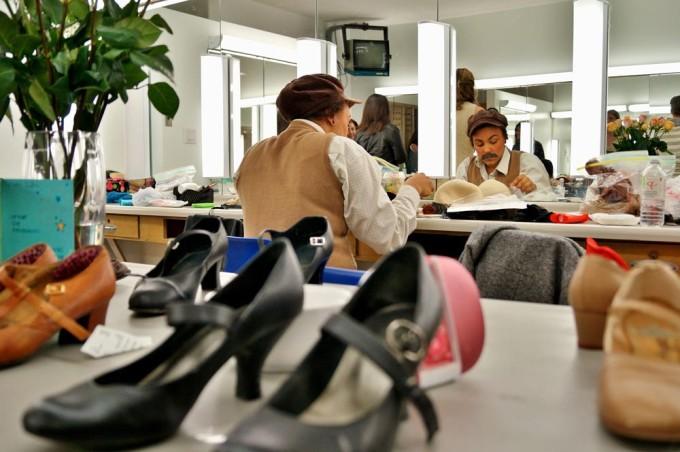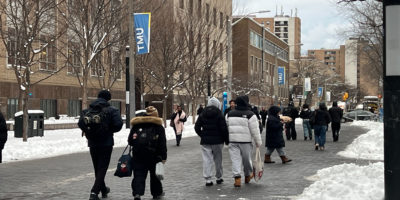By Nicole Schmidt
As the 10-minute call is announced, the actors begin to rush, preparing to take their places on stage. The brightly lit dressing room is lined with mirrors, each one occupied by a cast member touching up their makeup, hair, or costume.
With the clock ticking, actors start working on getting into character.
They each have a unique system.
Some are calmly doing yoga outside of the dressing room while others are singing at the top of their lungs or reading out loud from diction books.
One actor sits in a chair, bopping around to the music blasting from his headphones. As he stares at his reflection in the mirror, he smokes a fake cigarette. He’s focused and ready to go on.
A production assistant makes the five-minute announcement.
Flustered, somebody realizes that they’re wearing the wrong shoes.
After a few seconds of panic and some running around, the final call is announced.
“Places everyone.”
“What, how did that even happen?” says one of the actors.
It’s show time.
Summerfolk opened at the Ryerson theatre on Friday, Oct. 26 and runs until Nov. 2.
Written by Maxim Gorky in 1904 and directed by Dean Gilmour, Summerfolk is this season’s main-stage production. The play follows the Russian middle-class society as they learn to adapt to the social change prior to the Russian revolution.
On the path to self-discovery, the relationships and emotions of the characters are tested through arguments, alcohol consumption, and doubt.
But there’s plenty of stress offstage, as well.
“The pre-show is the hardest part,” says Jacqueline Prewer, the hair and makeup supervisor. “I need to make sure nothing’s flying away or coming undone.”
The show starts and the energy begins flowing through the theatre.
Although it’s a play driven by drama, the occasional sound of laughter can be heard backstage.
The lights dim sooner than expected, indicating that it’s time for intermission. Chatter takes over the quiet space and audience members filter out into the lobby, discussing their thoughts and predictions for the second half of the play.
Behind the scenes, the actors head to their dressing rooms to hydrate and take a brief break. Some return to their spots in front of the mirror to do some quick touch ups while others change costumes.
But, in some cases, actors have a limited amount of time to change.
Elysia White, who plays the female lead, Varya, is required to do a costume change in a minute and a half while the set is being prepared.
Actors practice these quick switches during rehearsal so that wardrobe malfunctions can be avoided at all costs during the show, especially if there are set switches.
It takes about 15 people to perform a set change, which happens in less than a minute. The large props are put on air castors to make moving them around easier.
“I had to figure out a way to design a set that was functional in between the acts,” said Tracy Lam, a fourth-year theatre production student and Summerfolk’s set designer. “It took a large crew to move things in and out because the set pieces were very heavy.”
But the audience never notices any of this. Their eyes are fixed on the centre of the stage, and as the final scene draws to a close the actors begin to take their bows, claps and cheers fill the theatre.
The curtains close and the actors head back to the dressing rooms one last time. Costumes return to hangers, shoes to their correct spots, belongings are gathered, and the once chaotic backstage becomes quiet again.
Until the next show.












Leave a Reply